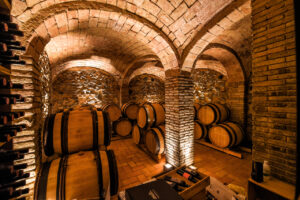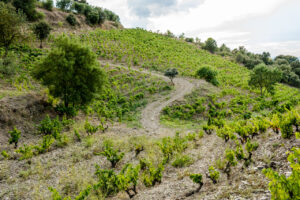SPAIN – PRIORAT
Emptying your bank account to buy a vineyard without any formal baggage of wine studies and at the urging of a group of like-minded friends would obviously be considered folly. Yet this is the path that Daphné Glorian took at the end of the 1980s. Indeed, surrounded by her adventure companions René Barbier, Alvaro Palacios, Carles Pastrana and Jose Luis Perez, they pooled their talents and their resources to create a new style of wine in a region rich in history, but without much proven track record for fine wines. In 1989, the modern Priorat was born : one wine but five different labels. In the end, what could be more logical for Daphné Glorian to call her wine after the name of the author of “The praise of madness”: Erasmus of Rotterdam.
Today, the property of Daphné bears the name of Clos i Terrasses in recognition of the Clos on which its fame is established and the terraces it cultivates. The estate is planted with 75% Grenache, 20% Syrah and 5% Cabernet Sauvignon.
The 2 vintages of the estate, Clos Erasmus and Laurel do not strictly speaking refer to independent vineyards, but they are starting to take shape in the vineyard. Due to the meticulous farming and observation that takes place throughout the year, by the time the grapes reach the winery in the fall, much of the blend has already been mapped by Daphne. When the primary fermentations come to an end, those decisions begin to blend in and the wines for Laurel are racked into a combination of 20 hectoliters wooden casks and 228 liter French oak barrels of second and third fill. It rests for 16 to 18 months before final assembly and bottling.
The nascent Clos Erasmus is intended for twelve 228-liter French oak barrels. Per vintage, around 7 barrels are new and 5 are second fill. Clos Erasmus remains in barrels for 18 to 20 months before bottling. In 2011, the very difficult decision was taken to declassify the entire Clos Erasmus as Laurel, making it the only vintage absent in the 30 years of the estate’s history.
Only 3000 bottles of Clos Erasmus are bottled on average per vintage despite the development of new plantations and vineyards. The objective of Clos i Terrasses is to retain the character of Clos Erasmus while continuing to improve the quantity and quality of Laurel. To facilitate this development, two new vineyards are being developed and experiments using concrete and amphorae in the cellar began with the 2013 vintage.
From Robert Parker, who tasted the estate’s wines from the start, to Jeb Dunnuck, Jay S Miller, Luis Gutierrez, Antonio Galloni, Decanter and Jancis Robinson, unanimity seems to be in the professional press as to the quality of Daphne’s wines.


